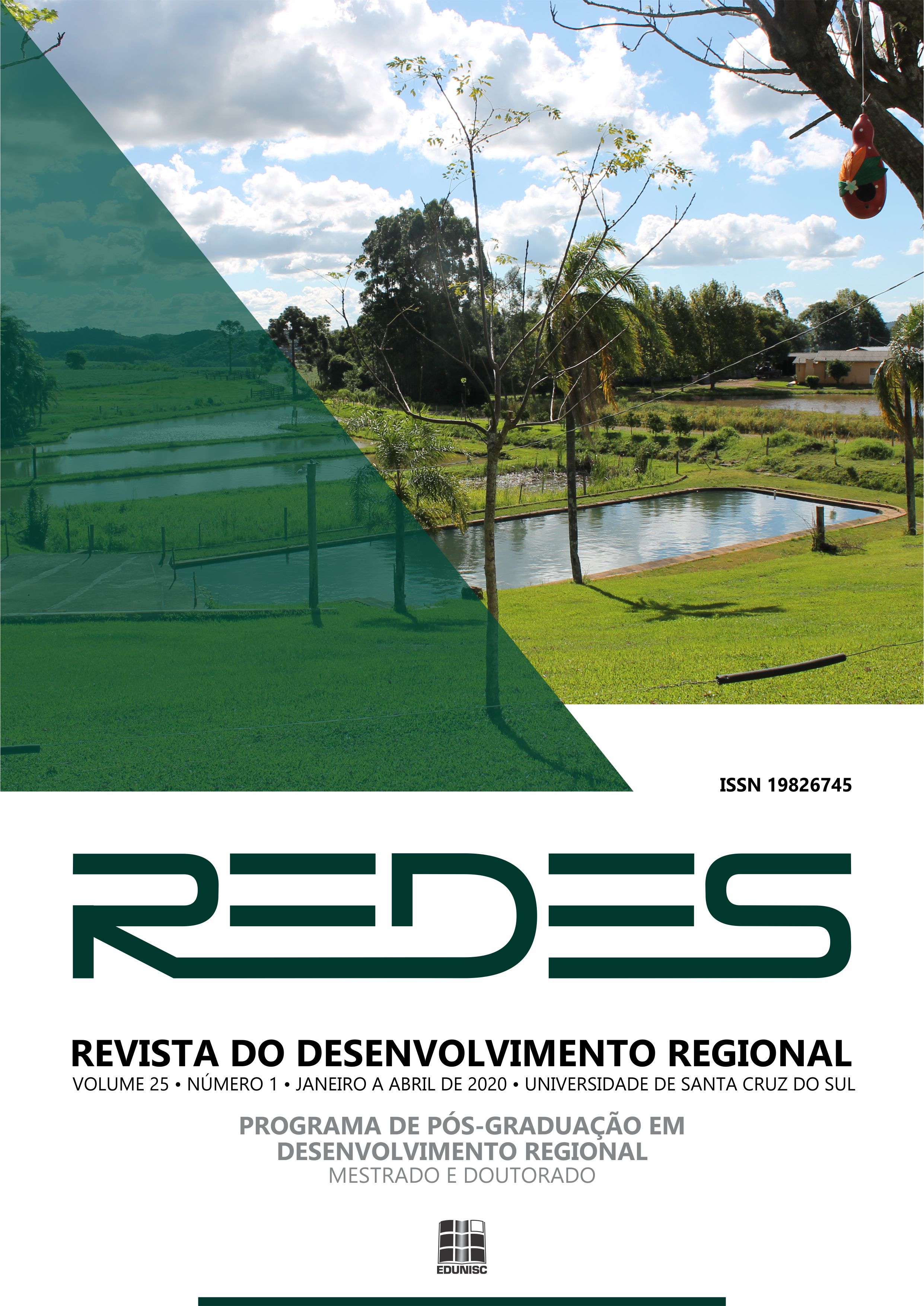Agricultura Familiar e Soluções Tecnológicas – agentes locais como protagonistas na geração de conhecimento
DOI:
https://doi.org/10.17058/redes.v25i1.14679Palavras-chave:
Resiliência. Identidade. Agência. Conhecimento. Tecnologia agrícola.Resumo
O presente trabalho é parte dos resultados do projeto de pesquisa em andamento intitulado “Análise do papel dos agricultores familiares na geração de soluções tecnológicas para a agricultura”. Objetiva: 1) compreender o papel dos agricultores familiares como agentes relevantes na geração de conhecimentos materializados em novos processos, produtos, técnicas e tecnologias para a agricultura; 2) identificar quais os caminhos conduzem à produção desses conhecimentos e quais suas possíveis potencialidades de transformação neles contidos. Para a localização das soluções geradas pelos agricultores criou-se uma rede de colaboradores que aplicaram um formulário – construído em parceria entre os agentes – nos anos 2017 e 2018. Posteriormente, organizou-se e sistematizou-se os dados coletados. Os colaboradores (equipe do projeto composta por professores, pesquisadores, bolsistas e acadêmicos) localizaram 58 técnicas, tecnologias, processos ou produtos gerados por agricultores familiares. A partir das soluções encontradas, a equipe de pesquisa realizou 18 entrevistas semiestruturadas com os agentes responsáveis pela criação de novos processos, técnicas e equipamentos para a agricultura familiar. Concluiu-se que a geração de soluções tecnológicas próprias é um elemento característico e definidor dos agricultores familiares como categoria, tendo em vista que estabelecem e têm clareza sobre os objetivos de sua atividade socioeconômica, ao mesmo tempo em que desenvolvem cada uma das tarefas existentes em sua unidade produtiva. Tal característica permite que o agricultor familiar identifique os problemas de cada processo e pense maneiras de solucioná-lo, seja modificando um método produtivo ou criando uma nova máquina ou equipamento.Downloads
Referências
ABRAMOVAY, R. Paradigmas do capitalismo agrário em questão. São Paulo: Unicamp e Hucitec, 1998.
ALBAGLI, Sarita; MACIEL, Maria Lucia. Informação, conhecimento e Inovação no Desenvolvimento Local. Ciência da Informação (Online), v. 33, n.3, p. 09-16, 2004.
BAIARDI, Amilcar; ALENCAR, Cristina Maria Macêdo de. Agricultura familiar, seu interesse acadêmico, sua lógica constitutiva e sua resiliência no Brasil. Rev. Econ. Sociol. Rural, Brasília , v. 52, supl. 1, p. 45-62, 2014 . Disponível em: <http://www.scielo.br/scielo.php?script=sci_arttext&pid=S010320032014000600003&lng=en&nrm=iso>. Acessado em 14 abril de 2018.
FEIX, Rodrigo Daniel; LEUSIN JÚNIOR, Sérgio. Painel do agronegócio no Rio Grande do Sul — 2015. Porto Alegre: FEE, 2015.
GOODMAN, David; SORJ, Bernardo; WILKINSON, John. Das Lavouras às Biotecnologias: agricultura e indústria no sistema internacional. Centro Edelstein de Pesquisas Sociais, Rio de Janeiro, 2008.
GIDDENS, A. A constituição da sociedade. 3. ed. São Paulo: WMF Martins Fontes, 2009.
______. The constitution of society: an outline of the theory of structuration. UK: Cambridge, Polity Press, 1984.
JEAN, B. A forma social da agricultura familiar contemporânea: sobrevivência ou criação da economia moderna. Cadernos de Sociologia, PPGS/UFRGS, Porto Alegre, v. 6, p. 76-89, 1994;
KARNOPP, Erica. Tendências de desenvolvimento da agricultura familiar: uma análise regional. RDE - Revista de Desenvolvimento Econômico, v. 14, p. 99-110, 2012.
LONG, Norman. Development sociology: actor perspectives. London: Routledge, 2001.
______. Sociología del desarrollo: una perspectiva centrada en el ator. México: Centro de Investigaciones y Estudios Superiores en Antropología Social, 2007.
MENEZES, Marilda; MALAGODI, Edgard Afonso . Os camponeses como atores sociais: a perspectiva da autonomia e da resistência. 24 p. Versão preliminar. Disponível em: <http://www.ufrgs.br/pgdr/arquivos/ipode_35.pdf >. Acesso em: jun. 2015.
PINTO, Álvaro Vieira. O conceito de tecnologia. Vol. 1. Rio de Janeiro, Contraponto, 2005.
SCHNEIDER, S. Teoria social, agricultura familiar e pluriatividade. Revista Brasileira de Ciências Sociais, São Paulo, V. 18, nº 51, p.99-123, 2003.
SCHUMPETER, Joseph Alois. Teoria do Desenvolvimento Econômico: uma investigação sobre lucros, capital, crédito, juro e o ciclo econômico. Tradução de Maria Sílvia Possas. Ed. Nova Cultural Ltda, São Paulo, 1997.
SHANIN, Teodor. A definição de camponês: conceituações e desconceituações – o velho e o novo em uma discussão marxista. Revista Nera, Presidente Prudente, ano 8, n.7, 2005, p. 1-21.
WANDERLEY, Maria de Nazareth Baudel. Agricultura familiar e campesinato: rupturas e continuidade. In: Estudos sociedade e agricultura, Rio de Janeiro, v.1, n.2, p.42-61, out. 2003.
______. O campesinato brasileiro: uma história de resistência. RESR, Piracicaba-SP, Vol. 52, Supl. 1, p. S025-S044, 2014 – Impressa em Fevereiro de 2015.
______. Raízes históricas do campesinato brasileiro. In: TEDESCO, J. C. Agricultura familiar: realidades e perspectivas. Passo Fundo, Ed. UPF, 1999, (p.23-56).
WOLF, Eric. Las Luchas Campesinas del Siglo XX. Siglo Veintiuno Editores, México, 1972.
Downloads
Publicado
Como Citar
Edição
Seção
Licença
A submissão de originais para este periódico implica na transferência, pelos autores, dos direitos de publicação impressa e digital. Os direitos autorais para os artigos publicados são do autor, com direitos do periódico sobre a primeira publicação. Os autores somente poderão utilizar os mesmos resultados em outras publicações indicando claramente este periódico como o meio da publicação original. Em virtude de sermos um periódico de acesso aberto, permite-se o uso gratuito dos artigos em aplicações educacionais e científicas desde que citada a fonte conforme a licença CC-BY da Creative Commons. Creative Commons Atribuição 4.0 Internacional.
Creative Commons Atribuição 4.0 Internacional.



